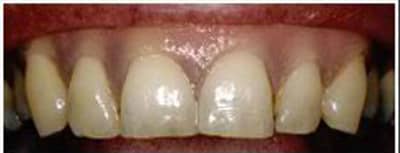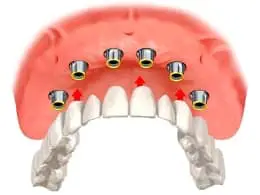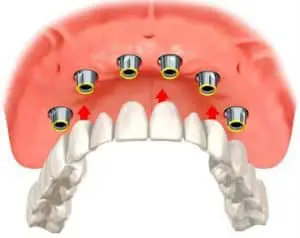I read that something called pinhole surgery can fix gum disease. Is this true? My dentist wants me to go in every three months. This could save me a lot of trips.
Stacey A.
Dear Stacey,
There’s some misunderstanding here. The pinhole surgical technique is an advancement in repairing the aftermath of gum disease. Gum disease causes your gums to recede and also some bone loss. Many times, patient’s gums would end up looking like what you see below.

Receding gums as a result of gum disease
It used to be that you’d have to have gum tissue taken from your soft palette then grafted onto your gums. Now, thanks to the Chao Pinhole Technique, you can now have your gums repaired, permanently without incisions or sutures.
How Does the Pinhole Technique Work?
Instead of the traditional surgery used both currently and in the past, this just requires a small pinhole placed in your gums. From there, the dentist will use specially designed tools that will loosen and then reposition the soft tissue of your gums over your teeth. It’s minimally invasive and permanent. Once it’s completed, your gums will look healthy again, like in the picture below.
Treating Your Gum Disease
It’s common for patients to need additional cleanings and treatments when they have gum disease. Your dentist isn’t asking anything excessive or out of the ordinary. Be aware, sometimes gum disease is so severe that it may require a specialist.
If yours is very advanced, you may want to consider seeing a specialist. For instance, after graduate school, Dr. Pumphrey spent an additional three years studying periodontics.
Getting your gum disease under control won’t matter if you don’t develop good habits. Gum disease will return. For a while, it will even require extra effort by brushing after each meal and not just twice a day. You’ll also need to floss after each meal as well.
Tragic Results of Gum Disease
Untreated gum disease will cost you your teeth. It’s how many patients end up wearing dentures. You won’t want to spend a lifetime with removable tooth replacements which get food under them, reduce your chewing capacity, and can slip out of your mouth.
Even if you replaced your lost teeth with dental implants, which are permanent replacements and like having healthy teeth in your mouth again, you wouldn’t be a candidate for this procedure until after your gum disease was completely treated.
It’s much better for you (not to mention your bank account) in the long run if you get that treated before losing your teeth.
This blog is brought to you by Atlanta Periodontist Dr. David Pumphrey.










